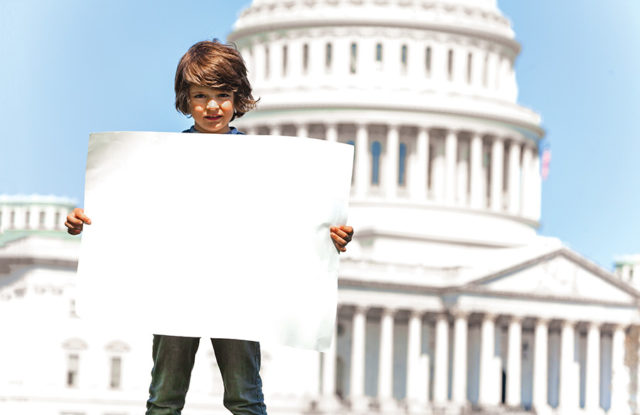After the contentious 2016 elections, every one of Alison Bomba’s clients brought up the topic of politics and how fearful it made them. Bomba is a Frederick-based psychologist who specializes in child and adolescent anxiety — the clients who were feeling so overwhelmed were actually kids.
“It came up in all of my sessions,” she says. “I had a lot of kids coming in with very high anxiety and a lot of fear.”
 The year ahead, of course, brings another round of elections. There is also a presidential impeachment unfolding in our capital. And a 24-hour news cycle that has increased its reach from our own phones and TVs to Snapchat, TikTok and the other places our children like to inhabit.
The year ahead, of course, brings another round of elections. There is also a presidential impeachment unfolding in our capital. And a 24-hour news cycle that has increased its reach from our own phones and TVs to Snapchat, TikTok and the other places our children like to inhabit.
How can today’s parents educate their kids about the political process and at the same time shield them from the tumultuous Twitter tit-for-tat that feels so demoralizing? We asked media and parenting experts for their navigational advice.
Find their fears
When Bomba talked with her clients about their post-election anxiety, she found out that many had been exposed to news they were not ready for. It’s hard to shelter kids in today’s news-saturated world, she admits. Even if parents succeed at doing this, there is another influencer: kids at school.
“Kids talk at school and information gets skewed, like that old-fashioned telephone game,” she says.
If a child is worried, find out what he or she heard, and ask about the “what if” scenarios that are going through their minds.
“Ask them, ‘What are you afraid of?’” Bomba says. “If it’s something ridiculous or absurd, you can squash that right away.”
Younger children might think that news they heard will lead to a catastrophic result, such as war. Parents can tell them that’s really unlikely to happen, and using collaborative problem solving, they can brainstorm with a child for five reasons why, she says.
Finally, keep it simple, Bomba says. Tell children the news (“we’ve had an election, and here’s who won”), and then ask them about the questions they have.
Don’t shun social media
“Twitter is our public conversation now, but it can be very inappropriate for children,” says Caroline Knorr, senior media editor for Common Sense. The organization is a national nonprofit that provides families and schools with tech and entertainment recommendations.
But what’s said on Twitter makes its way quickly to other news outlets. This can provide parents with many teachable moments, Knorr says. The most obvious one for 2020 is that politics is a “contact sport.” Political comments are often emotional and designed to get attention — two great points to make with children.
“It’s a good time to talk about your own family values,” she says. Parents can say, “When we disagree in our family, we are respectful, and we use facts to support our views,” she suggests.
A Common Sense survey revealed that kids get most of their news from their families and other kids, but they like to get news from social media. Parents should not trivialize a child’s interest in social media, Knorr says, but use it as another opportunity.
Find out how media literate your child is, she advises. Common Sense also has a checklist to help teens fact-check the news they consume.
Ask these questions
After the 2016 election, many educators started to look into how we consume news and consider our news sources. Sarah McGrew, a former teacher in Washington, D.C., is one such researcher. McGrew works as an assistant professor of education at the University of Maryland, College Park, and studies how students evaluate information online.
Parents should have conversations with their children not only about the news, she says, but also how the news is produced.
It’s easy for both adults and kids to jump into appealing or riveting online content. But they should first ask where the content comes from and if that source is reliable and recognizable.

What makes a source reliable? Parents should explain to kids how reputable news sources have reporters who name their sources, editors who read over stories and fact checkers to verify information. Reputable news sources also print corrections when they get something wrong.
“That’s the process of news that leads us to put our trust in an organization,” she says.
And these questions, too
The third question to consider is whether there is evidence to support this news. What do other sources say? This is particularly important to evaluate as kids view videos, photos and infographics, which they consider to be reliable even when they are not, McGrew says.
“One of the strengths of the internet is that there are always other sources,” she says. “We do not have a scarcity of information.”
A study from the Stanford History Education Group released in 2016 revealed that 82 percent of middle schoolers can’t tell the difference between an online news story and an online advertisement. It’s good then for parents to review with children the different types of content on a website — news story, opinion, advertisement and more, says McGrew, who was one of the study’s co-authors.
“An informed citizenry is the bedrock of democracy,” she says. “And we are increasingly informing ourselves on the internet.”




